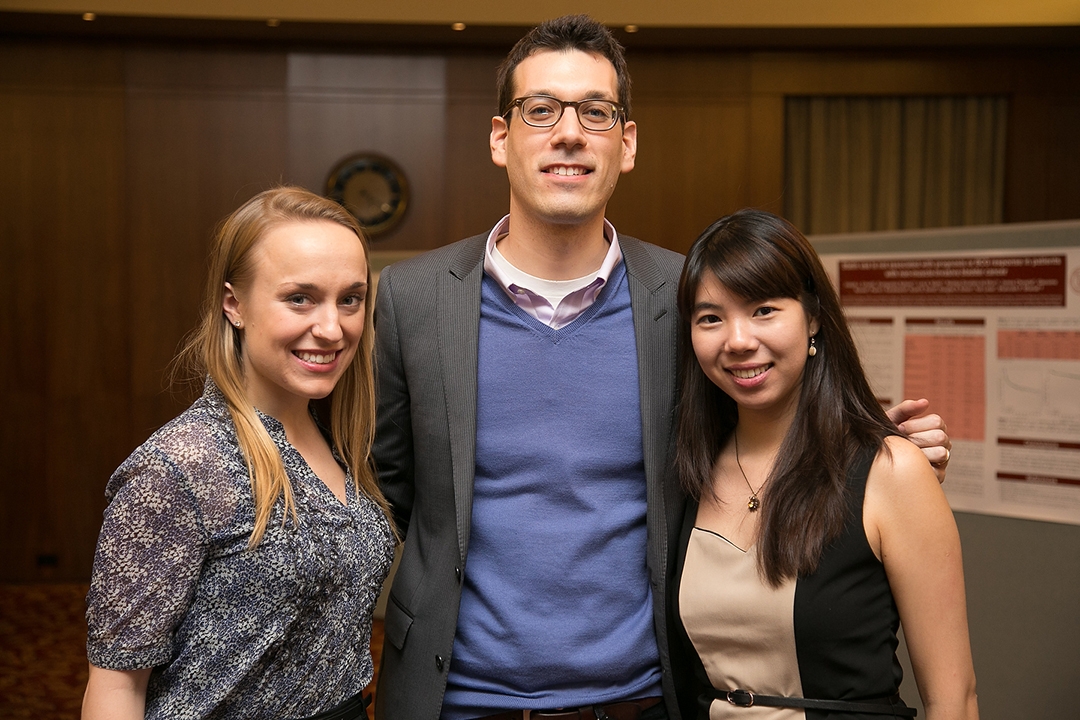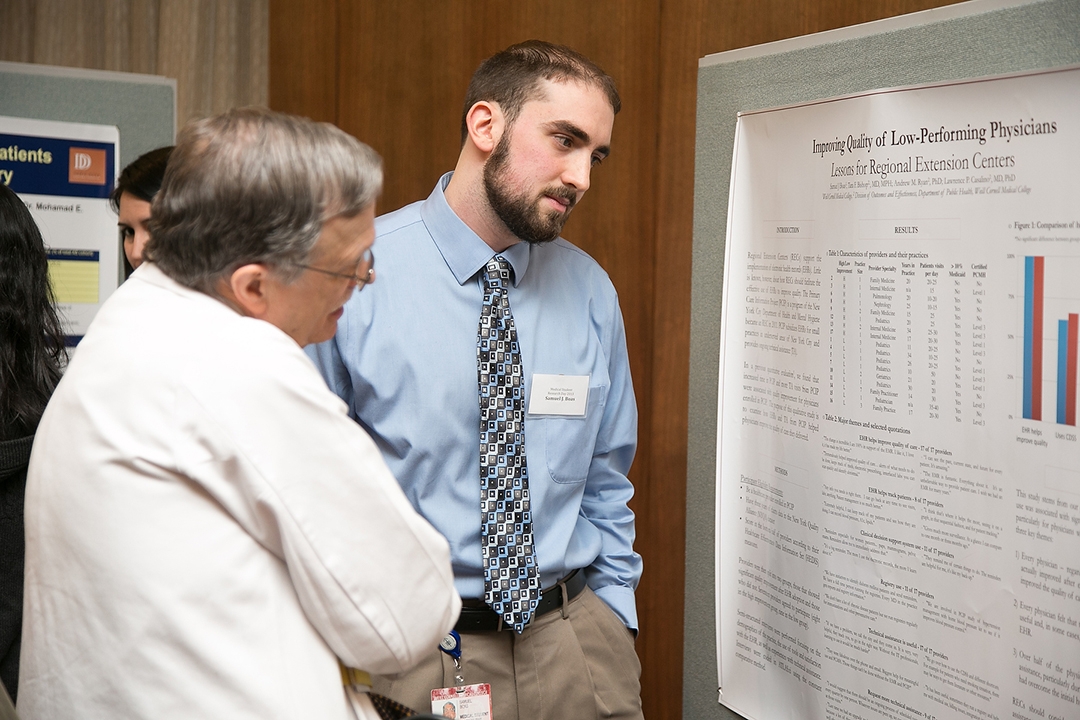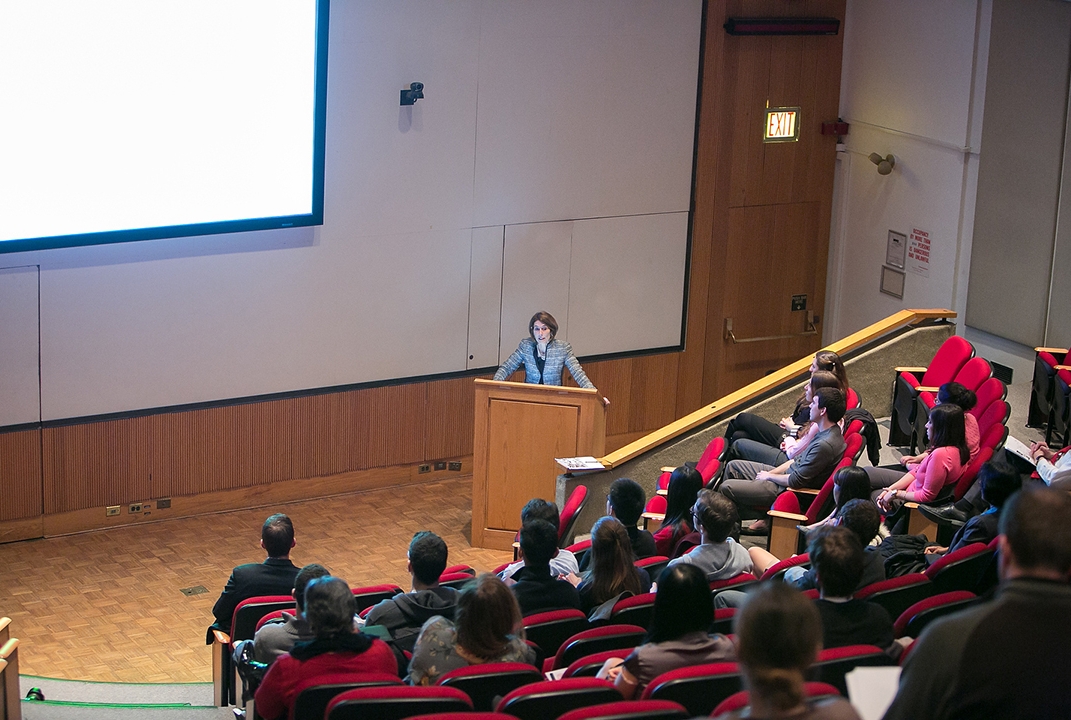For Kelley Bohm, presenting her research on dry eye syndrome at Weill Cornell Medical College's Medical Student Research Day was as much about showing her peers what she accomplished as it was a trial run.
A second-year medical student at Weill Cornell, Bohm spent last summer and fall conducting research with Dr. Christopher Starr, associate professor of ophthalmology at Weill Cornell and an ophthalmologist at NewYork-Presbyterian/Weill Cornell Medical Center. She set out to determine whether a subjective symptomatic questionnaire or an objective osmolarity tear measurement system would accurately diagnose dry eye syndrome in elderly patients. Since there was no significant correlation between the two results, she concluded that the questionnaire, while free and relatively quick, may not be the best method of diagnosing dry eye syndrome in elderly patients.
Last month, she presented the findings of her research project, sponsored by the MSTAR Summer Research Fellowship Program from the Weill Cornell Division of Geriatrics and Gerontology, to her fellow trainees, faculty and other investigators during the 11th annual Medical Student Research Day. Not only did her poster presentation tie for first-place during the half-day event, but she also received feedback that she'll take with her as she presents her research during the American Geriatrics Society annual meeting in May in Texas.
"Presenting my study at Medical Student Research Day was a great way for me to show my peers and the faculty what I had accomplished over the summer," she said. "It was also a great opportunity to help me practice my presentation skills since I will be presenting this work at a conference in May. There were so many other outstanding posters, and I'm excited to have been recognized as one of the top scorers."
The student-run Medical Student Research Day event featured oral and poster presentations across the medical disciplines from 25 student researchers, who dedicated summers and evenings — some even took a year off from school — to conduct their studies.
"One of the important missions of Weill Cornell Medical College is to produce physician-scientists," said Roselyn Kellen, a first-year medical student and member of the Medical Student Research Day Planning Committee. "Medical Student Research Day celebrates basic science clinical and public health research while recognizing our medical students' contributions to these fields."
The projects are judged by faculty members and provide students with constructive criticism on a skill that's essential to the medical field. Bohm joined fellow students Alexander Port and Yvonne Wang, all of who worked in the Department of Ophthalmology for their research, in a three-way tie for first place.

From left, Kelley Bohm, Alexander Port and Yvonne Wang.
"It's an opportunity to share with the Weill Cornell community this research," said Dr. Brian Lamon, assistant dean for research development, director of medical student research at Weill Cornell and faculty advisor of the event. "That's a fundamental part of science, being able to communicate your work, share it with others, get feedback and ideally incorporate that feedback when you go back to the drawing board."
Dr. Laurie H. Glimcher, the Stephen and Suzanne Weiss Dean of Weill Cornell Medical College, kicked off this year's activities by giving the keynote address, reprising a role she played in 2007 as Medical Student Research Day's first ever keynote speaker.
Sharing her own story of personal and professional successes, Dr. Glimcher imparted to her students words of wisdom she learned and lived through her 30 years as a physician-scientist.
"It's important to be a risk taker if you want to make major contributions in science. You can't be afraid," she said. "Another is that it's better to be lucky than to be smart. Keep an open mind so if you get a result you don't expect, you don't push it away because it wasn't what you thought it was. Finally, and equally important, you need to balance all these different parts of your life together."
Dr. Glimcher's distinguished career, Kellen said, is the paradigm for what Weill Cornell medical students all aspire to achieve.
"I can speak for the entire student body when I say that you truly are a role model to all of us because you are a physician who has contributed immensely to biomedical research," Kellen said.
While these students are just starting their medical careers, they are already making a difference.
Take fourth-year medical student Alexander Port, for example. He dedicated last fall to studying risk factors related to retinopathy of prematurity, a condition that can cause blindness in premature infants and is currently a leading cause of childhood blindness worldwide.
For his research, Port worked with Dr. R. V. Paul Chan, director of the Retina Service, the St. Giles Associate Professor of Pediatric Retina and associate professor of ophthalmology at Weill Cornell and an ophthalmologist at NewYork-Presbyterian/Weill Cornell, as well as Dr. Chan's collaborator, Dr. Michael F. Chiang, the Knowles Professor of Ophthalmology and Medical Informatics and Clinical Epidemiology at Oregon Health and Science University.

Second-year medical student Samuel Boas presents his research to Dr. Oliver Fein, professor of clinical medicine and professor of clinical public health.
Port discovered that, in addition to low birth weight and extreme prematurity, several other risk factors associated with retinopathy of prematurity include prolonged mechanical ventilation, sepsis and problems with the lungs or digestive tract. In addition, Port discovered that there may be some other as yet unstudied factor that determines whether infants develop the disease. The answer may lie in an individual's genes, and Port is currently collecting DNA samples from former patients in order to help identify any possible genetic factors.
"No one does research in a vacuum — the point of conducting research is to share our findings to help improve medical care," he said. "As a student, it is wonderful to have the opportunity to practice presenting our research in a formal setting such as Medical Student Research Day."
Second-year medical student Yvonne Wang worked with Dr. Mark Rosenblatt, associate professor of ophthalmology and director of the Margaret M. Dyson Vision Research Institute at Weill Cornell, and Dr. Ryan St. Clair, a cornea research fellow at Weill Cornell, from June through December examining changes of the cornea and tear production unit as a result of scleral lens. She followed patients using the Prosthetic Replacement of the Ocular Surface Ecosystem device — known as the PROSE lens — a lens that sits on the white part of the eye and creates a reservoir of saline for the cornea that helps patients who have severe dry eye disease and irregular corneal shape improve dryness and improves visual acuity.
She wanted to know if exposing the cornea to a saline environment for extended hours would change tear production, corneal sensation and corneal nerve morphology. She found that patients who wore the device for more than 30 days, at least six hours a day, had a decrease in tear production, increase in corneal sensation and decrease in corneal nerve thickness compared to thickness before treatment. Her findings suggest that the device promotes healing of the cornea, as well as its primary use for symptom relief.
Port and Wang will present their research at the Association for Research in Vision and Ophthalmology's annual conference in May in Seattle, Wash. Port also received a travel grant from the Association for the conference.
"It is a great honor to be one of the winners of Medical Student Research Day," she said. "This award has increased my motivation to continue conducting research during my time as a medical student at Weill Cornell. I am very excited to take what I have learned from Medical Student Research Day and apply it towards my future career as a medical scientist."

